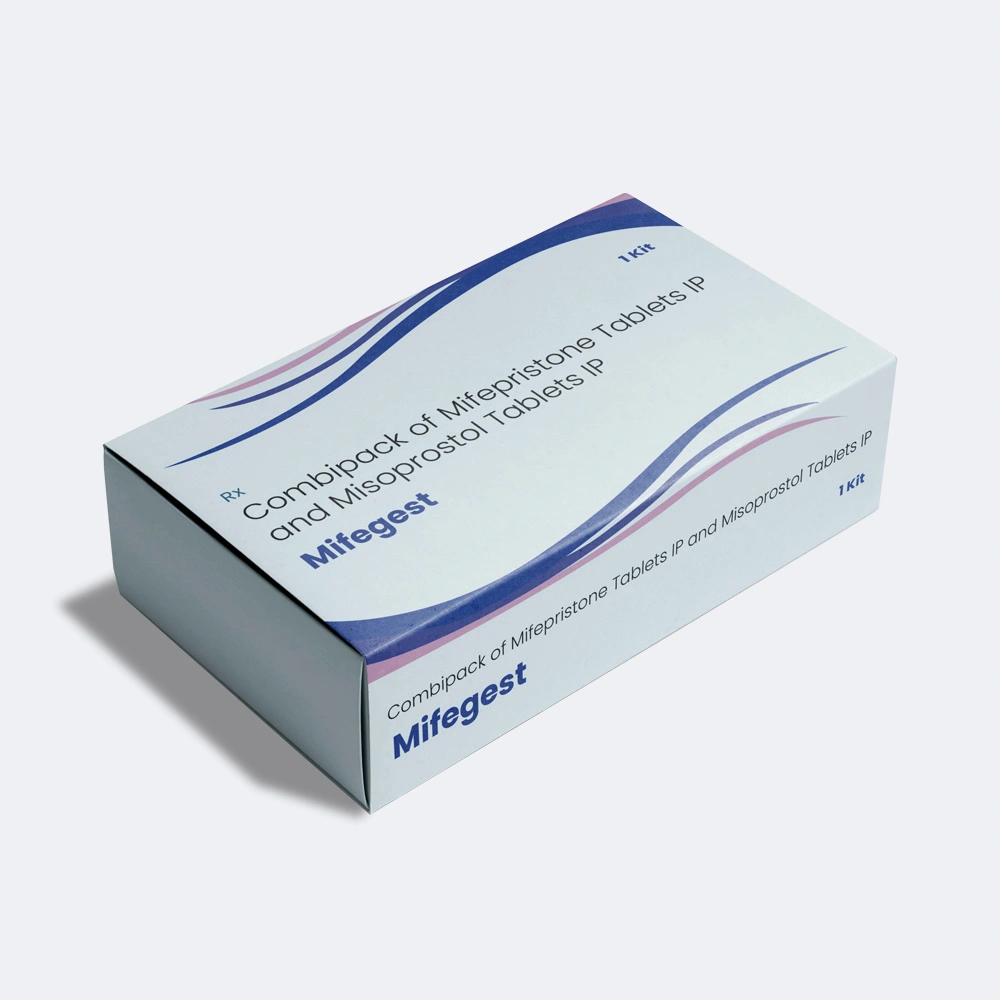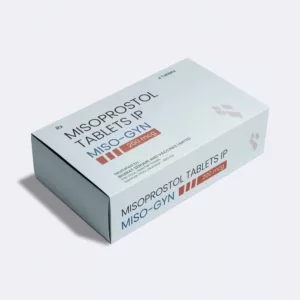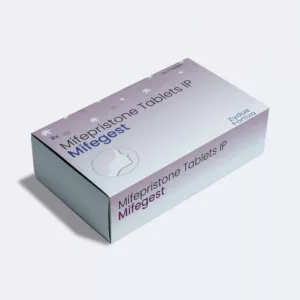Contains
Mifepristone and Misoprostol
Treats
Pregnancy termination of not more than 9 weeks
Manufactured By
Zydus Lifesciences Limited
Description
How does it Work?
The MTP Kit, or complete abortion kit, contains two main components: Misoprostol and Mifepristone tablets. These pills work together to terminate a pregnancy effectively.
Mifepristone blocks the effects of progesterone, a hormone crucial for maintaining pregnancy. By inhibiting progesterone activity, Mifepristone causes the placenta to detach from the uterine wall, halting fetal development.
On the other hand, Misoprostol softens the cervix and triggers uterine contractions. These combined effects result in the shedding of the uterine lining and the expulsion of pregnancy tissue through the vagina.
Usually, the MTP Kit involves taking Mifepristone and Misoprostol in a specific order. In some instances, Misoprostol alone can induce abortion, though it may be less effective than the combined regimen.
Uses
Medical abortion: Medical abortion is a procedure that uses medicine to end a pregnancy. It does not require surgery or anesthesia.
Recommended Dose
The recommended dosage for terminating pregnancy consists of orally taking 200 mg of Mifepristone. This is followed by inserting 800 mcg of Misoprostol vaginally, usually 1 to 3 days later.
Women have the option to self-administer Misoprostol or seek assistance from a doctor.
If abortion doesn’t occur within 4 hours for women between 49 to 63 days of pregnancy, an additional 400 mcg of Misoprostol (2 tablets of 200 mcg) can be taken vaginally or orally, based on individual preference and bleeding patterns.
Missed Dose
You should take this medicine exactly as prescribed by your doctor. Therefore, the likelihood of missing a dose is minimal.
Overdose
Signs of overdosage may include drowsiness, shaking, seizures, breathing difficulties, stomach pain, diarrhea, fever, rapid heartbeat, low blood pressure, or a slow heart rate.
In the event of an overdose, we suggest you to seek advice from your doctor.
Side Effects
While using the complete abortion kit, be mindful of potential side effects that may arise.
- Womb tearing after prostaglandin administration in the second or third trimester.
- Heavy bleeding
- Fever
- Foul-smelling discharge
- Uterine contractions or lower abdominal cramps
- Gastrointestinal cramping
- Nausea
- Vomiting
- Diarrhea
- Skin rashes
- Headaches
- Malaise
- Hot flushes
- Dizziness
- Chills
- Low blood pressure
- Hives
- Serious skin disorders
If any of these side effects occur, it’s essential to seek medical attention immediately.
Safety Advise
Do not take mifepristone and misoprostol tablets if:
- You haven’t confirmed your pregnancy through a gynecological exam, ultrasound, or tests.
- It has been more than 63 days since the first day of your last period (your doctor can confirm the pregnancy’s age).
- There is suspicion of an ectopic pregnancy (when the egg implants outside the womb).
- You have bleeding disorders or use blood-thinning medications.
- You have undergone genital cutting or circumcision.
- You cannot return for a follow-up visit to ensure pregnancy termination.
- You cannot access emergency medical help within two weeks after taking these tablets.
- You are allergic to mifepristone, misoprostol, prostaglandins, or any other ingredients in the medicine.
- You have severe asthma not manageable with medication.
- You have hereditary porphyria (a blood disorder).
- You have chronic adrenal failure.
- You have an intrauterine device (this must be removed before taking mifepristone).
Additionally, inform your doctor if you:
- Have a heart condition.
- Have an artificial heart valve.
- Have risk factors for heart disease, such as high blood pressure or cholesterol levels.
- Have asthma.
- Have a condition affecting blood clotting.
- Have liver or kidney disease.
- Are anemic or malnourished.
Your doctor will discuss whether the treatment suits you in these cases.
Medical Interactions
Make sure to inform your doctor about any other medications you are currently taking or have recently taken.
Some medicines containing these active substances can interfere with mifepristone and misoprostol:
- Corticosteroids (used for asthma or inflammation).
- Ketoconazole, itraconazole (antifungal treatments).
- Erythromycin, rifampicin (antibiotics).
- St. John’s Wort (a natural remedy for mild depression).
- Phenytoin, phenobarbital, carbamazepine (used for seizures or epilepsy).
To minimize the risk of diarrhea, it is advised to avoid antacids containing magnesium. If necessary, consider using antacids containing aluminum or calcium instead.
Avoid consuming alcohol while taking this medicine, as it can increase the likelihood of experiencing side effects.
Additionally, it is strongly recommended to avoid consuming grapefruit juice while undergoing treatment with mifepristone and misoprostol.
Storage
Store the MTP Kit at temperatures below 25°C. Keep the pills in a cool, dry place, away from direct sunlight.
Ensure they are stored out of reach of children and pets. Always check the expiration date before using the MTP Kit.
FAQ’s
-
Does the MTP kit affect my chances of pregnancy?
The MTP Kit or the abortion pill does not usually affect your chances of getting pregnant in the future. It also doesn’t increase the risks of pregnancy complications if you wish to get pregnant in the future.
-
When should I use the MTP kit?
The MTP kit is intended for a pregnancy of not more than 10 weeks, counted from the first day of your last menstrual cycle.
-
What should I expect after completing my course?
Vaginal bleeding, cramps, and diarrhea are the most common side effects after completing the course. If you experience any unusual side effect of the drug that persists for long, contact your doctor.
References
- Wingo E, Raifman S, Landau C, Sella S, Grossman D. Mifepristone-misoprostol versus misoprostol-alone regimen for medication abortion at ≥24 weeks’ gestation. Contraception. 2020 Aug;102(2):99-103. doi: 10.1016/j.contraception.2020.05.001. Epub 2020 May 12. PMID: 32407810. https://www.contraceptionjournal.org/article/S0010-7824(20)30149-9/fulltext
- Sonalkar S, Koelper N, Creinin MD, Atrio JM, Sammel MD, McAllister A, Schreiber CA. Management of early pregnancy loss with mifepristone and misoprostol: clinical predictors of treatment success from a randomized trial. Am J Obstet Gynecol. 2020 Oct;223(4):551.e1-551.e7. doi: 10.1016/j.ajog.2020.04.006. Epub 2020 Apr 17. PMID: 32305259; PMCID: PMC7529708.https://www.ajog.org/article/S0002-9378(20)30431-2/fulltext
- Chen MJ, Creinin MD. Mifepristone With Buccal Misoprostol for Medical Abortion: A Systematic Review. Obstet Gynecol. 2015 Jul;126(1):12-21. doi: 10.1097/AOG.0000000000000897. PMID: 26241251. https://journals.lww.com/greenjournal/Abstract/2015/07000/Mifepristone_With_Buccal_Misoprostol_for_Medical.4.aspx
- Schreiber CA, Creinin MD, Atrio J, Sonalkar S, Ratcliffe SJ, Barnhart KT. Mifepristone Pretreatment for the Medical Management of Early Pregnancy Loss. N Engl J Med. 2018 Jun 7;378(23):2161-2170. doi: 10.1056/NEJMoa1715726. PMID: 29874535; PMCID: PMC6437668. https://www.nejm.org/doi/10.1056/NEJMoa1715726




Christy Patrick –
A lifesaver! Worked perfectly, with no issues. Shipping was super quick and discreet.
Felicia Prince –
No issues, highly recommended.
Betselot Minda –
MTP Kit was effective, and the process was smooth. Arrived fast with discreet packaging.
Jeffrey Mulvehill –
Worked exactly as expected.